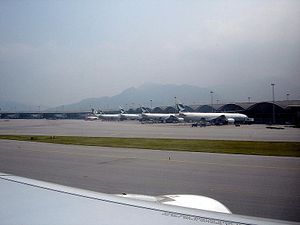Before last year, Andrew had never considered building a life anywhere other than in Hong Kong.
It was only when Beijing imposed a sweeping national security law last summer that Andrew — an entrepreneur in his 30s who participated in the 2019 anti-government protests — realized he no longer felt safe. In August, he and his parents decided to leave the city for good. They sold all their local properties and bought one-way tickets to the United Kingdom.
Andrew is one of a growing number of Hong Kongers taking advantage of a new U.K. visa scheme that offers a pathway to British citizenship for those with a British National (Overseas) passport. The scheme, which opened on January 31, allows applicants and their dependents to live and work in the U.K. for five years, after which they can apply for citizenship.
A legacy of British colonial rule, the BNO is available to any Hong Kong resident born before 1997, which amounts to around 70 percent of the city’s population of 7.5 million people. Prior to the new scheme, BNO holders could stay in Britain for six months at a time but did not have the right to work or settle. Applications for the passport have soared by more than 300 percent since the national security law was passed last July, with about 733,000 BNO holders registered as of mid-January.
“I was worried I would be arrested if I stayed. Things have gotten worse very quickly,” said Andrew, who founded a nonprofit advocating for democracy and providing financial assistance to victims of police violence in Hong Kong. He’s now in Newcastle applying for the visa with his parents. “I took my parents with me because I was worried that one day the police or other state agents would harass [them] if they stayed. Without the BNO, I wouldn’t know what to do.”
The scheme is a direct response to the national security law, which Britain calls a serious violation of the “one country, two systems” agreement that guaranteed local autonomy and key freedoms in the city for 50 years following its 1997 handover to China. Since the law was imposed, dozens have been arrested in a series of crackdowns on Hong Kong’s pro-democracy movement. While Hong Kongers have generally expressed gratitude for the BNO scheme, many have also pointed out that a significant number of the city’s young protesters — who were born after 1997 — are not eligible.
The offer has exacerbated tensions between London and Beijing. The Chinese government reacted to the scheme with fury, demanding that the U.K. and other Western countries stay out of the state’s internal affairs. Last week, Beijing announced it will no longer recognize the BNO. While it’s unclear how this may affect BNO holders practically, the move may pave the way to further restrictions.
Over the next five years, Britain expects more than 322,000 Hong Kongers to take up the visa offer, bringing a “net benefit” of up to 2.9 billion British pounds ($4 billion) to the U.K. economy, AFP reports.
The exodus has triggered fears of a brain drain in Hong Kong, with analysts predicting that it could also lead to capital outflows of HK$280 billion ($36 billion) this year, according to a report published last month by the Bank of America.
The pathway to citizenship is also not cheap. Applicants must pay 180 pounds for a two-and-a-half-year visa or 250 pounds for a five-year visa. In addition, they must pay the international health surcharge to use NHS health services, which costs 624 pounds per year for adults and 470 pounds for those under 18 years old.
“We have been worried about the political environment since the 2014 [Umbrella Revolution] protests, but we didn’t have the resources to emigrate then,” said Ray, an IT professional now applying for the visa with his wife and two-year-old daughter in the U.K. “We moved 50 percent for our daughter’s future, and 50 percent for ourselves. We don’t trust the police or rule of law in Hong Kong anymore.”
As the number of Hong Kongers arriving in the U.K. continues to grow, community leaders say the government must step up efforts to provide sufficient support services to this at-risk group. They say local authorities have not made adequate preparations for new arrivals, leaving many stranded in bureaucratic limbo and facing difficulties when trying to access housing, employment, healthcare, banking services, and more.
“These people came to seek a safe haven,” said Jabez Lam, a support worker who runs the Hackney Chinese Community Services. He has given advice to over 30 new Hong Kong arrivals in recent months, and says many are struggling with PTSD and other mental health issues that have been exacerbated by the pandemic. “The government needs to coordinate with local authorities so that people on the ground don’t need to suffer additional hardships,” he said. “Many are suffering in silence.”

































